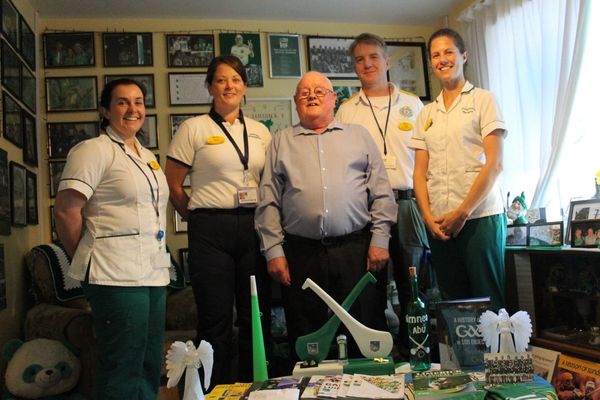Pathfinder Service Keeping Older People Safely At Home Expands Into Clare and Tipperary

- Advanced paramedics and therapists respond to low-acuity 999 calls to keep older patients out of hospital
- Almost half of patients managed at home in six-month period in MidWest
(LIMERICK: 16.10.2023): A SERVICE that aims to safely keep older people who phone 999/112 in their home rather than bringing them to a hospital emergency department is now responding to calls in Clare and north Tipperary.
A partnership between the National Ambulance Service and the UL Hospitals Group, Pathfinder launched in Limerick in October 2022 and has in recent weeks expanded its geographical area of operations across the MidWest.
The Pathfinder rapid response team responds to low acuity 999/112 calls for older people (65 years and older). This may be someone who, for example, has experienced a fall at home or who is generally unwell. The older person is assessed by both an advanced paramedic and occupational therapist or a physiotherapist.
Where safe, the team supports the older person at home rather than transporting them to an Emergency Department, by linking with a wide range of alternative hospital and community services. If the patient does require assessment in the Emergency Department, they will be brought directly to their nearest ED.
Pathfinder also operates a follow-up team (physiotherapy and occupational therapy) which provides immediate home-based rehabilitation, equipment provision and case management in the subsequent days following the 999/112 call.
Pathfinder is currently expanding across the country and over the first eight months of 2023, a total of 2,874 ambulance calls have been referred to the Pathfinder teams. Of these, a total of 42% of the patients (1,207) involved were able to stay at home, where they availed of alternative pathways of care rather than going to hospital. Over the last six months (April-September) in the MidWest, 188 patients were assessed by the regional Pathfinder team, of whom 47% were supported at home without the need to go to the ED.
One patient with direct experience of the Pathfinder service is Pa Buckley, 70, from Ballinacurra Weston in Limerick city, and who lives with a number of health conditions including asthma and chronic inflammation.
“I have been lucky enough to have the Pathfinder team out to me more than once and I think they provide a great service. I have a few health conditions so I am used to going in and out of hospital. I always get great care in UHL but, like everyone else, I would prefer to stay at home if I could avoid it.
“I think Pathfinder is a great idea and I am happy to see it become more widespread across the country. They can treat you at home or organise referrals for you so you don’t have to go into a very busy hospital looking after some very sick people –and that is the way of the future. They are the professionals and if they feel you do need to go to hospital, they will bring you in. I have experienced both situations with the Pathfinder team and I think it is the way things should have been done long before now,” said Mr Buckley.
Keith Mullane, Assistant Chief Officer, National Ambulance Service, Limerick, said: “We are delighted to have rolled out the Pathfinder service into Clare and North Tipperary. As the National Ambulance Service evolves from an emergency medical service (EMS) to a mobile medical service (MMS), a key priority is to ensure patients are getting the right care in the right setting.
“Our service is developing a number of alternative care pathways, including the community paramedic service and the APP car, which has commenced operations in the MidWest in recent weeks. By minimising journeys to the ED and offering safe alternative care older people in their own homes, Pathfinder will improve outcomes for the over-65s in our region” Mr Mullane said.
Shirley Real, Allied Health Group Lead, UL Hospitals group, said: “We know that older adults are particularly at risk and have associated negative outcomes from lengthy wait times in ED settings. These can include functional decline and cognitive decline, as well as exposure to a noisy, stressful hospital environment. Health and social care professionals have been at the heart of developing alternative care pathways and admissions avoidance, such as the Geriatric Emergency Medicine Unit at UHL.
“Pathfinder is a collaboration with our colleagues in the National Ambulance Service which will reduce conveyance to hospital in the first place. We know that when a person is unwell, home comforts in addition to enhanced care from a specialised team can promote recovery. The importance of sleep, a familiar environment, as well as specialist knowledge to promote return to function are a welcome addition to community care. Patient feedback from the first year of operation of Pathfinder in the MidWest has been hugely positive and we are delighted to expand the service across the region.”

